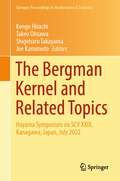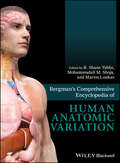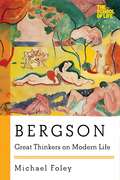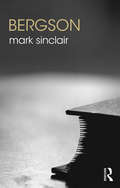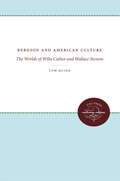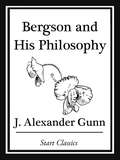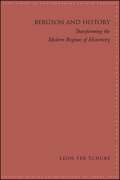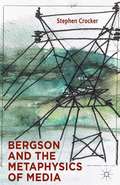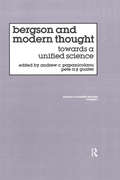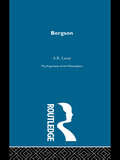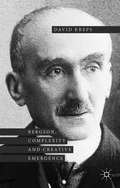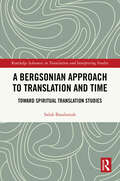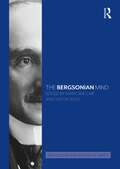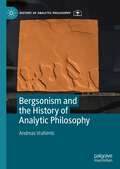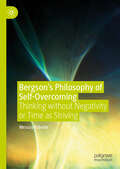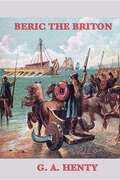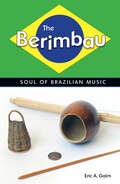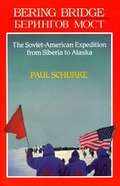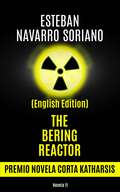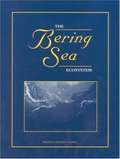- Table View
- List View
Bergin and Garfield's Handbook of Psychotherapy and Behavior Change
by Michael J. LambertPraise for Bergin and Garfield's Handbook of Psychotherapy and Behavior Change, Sixth Edition"Not only is this a unique resource, it is the only book that all practitioners and researchers must read to ensure that they are in touch with the extraordinary advances that the field has made over the last years. Many of us have all five previous editions; the current volume is an essential addition to this growing, wonderful series."-Peter Fonagy, PhD, FBA, Freud Memorial Professor of Psychoanalysis and Head of the Research Department of Clinical, Educational and Health Psychology, University College London"As either researcher or clinician living in the contemporary world of accountability, this invaluable edition of the Handbook is a must for one's professional library."-Marvin R. Goldfried, PhD, Distinguished Professor of Psychology, Stony Brook UniversityThe classic reference on psychotherapy-revised for the twenty-first centuryKeeping pace with the rapid changes that are taking place in the field, Bergin and Garfield's Handbook of Psychotherapy and Behavior Change, Sixth Edition endures as the most important overview of research findings in psychotherapy for professionals, academics, researchers, and students. This bestselling resource presents authoritative thinking on the pressing questions, issues, and controversies in psychotherapy research and practice today.Thorough and comprehensive, the new edition examines:New findings made possible by neuro-imaging and gene researchQualitative research designs and methods for understanding emotional problemsResearch in naturalistic settings that capitalizes on the curiosity of providers of servicesPractice-relevant findings, as well as methodological issues that will help direct future research
Bergin and Garfield's Handbook of Psychotherapy and Behavior Change
by Wolfgang Lutz Michael Barkham Louis G CastonguayCelebrating the 50th anniversary of a best-selling and renowned reference in psychotherapy research and practice. Now celebrating its 50th anniversary and in its seventh edition, Bergin and Garfield's Handbook of Psychotherapy and Behavior Change, maintains its position as the essential reference volume for psychotherapy research. This bestselling reference remains the most important overview of research findings in psychotherapy. It is a rigorous and evidence-based text for academics, researchers, practitioners, and students. In recognition of the 50th anniversary, this edition contains a Foreword by Allen Bergin while the Handbook covers the following main themes: historical and methodological issues, measuring and evidencing change in efficacy and practice-based research, therapeutic ingredients, therapeutic approaches and formats, increasing precision and scale of delivery, and future directions in the field of psychotherapy research. Chapters have either been completely rewritten and updated or comprise new topics by contributors including: Characteristics of effective therapists Mindfulness and acceptance-based therapies Personalized treatment approaches The internet as a medium for treatment delivery Models of therapy and how to scale up treatment delivery to address unmet needs The newest edition of this renowned Handbook offers state-of-the-art updates to the key areas in psychotherapy research and practice today. Over 60 authors, experts in their fields, from over 10 countries have contributed to this anniversary edition, providing in-depth, measured and insightful summaries of the current field.
The Bergman Kernel and Related Topics: Hayama Symposium on SCV XXIII, Kanagawa, Japan, July 2022 (Springer Proceedings in Mathematics & Statistics #447)
by Kengo Hirachi Takeo Ohsawa Shigeharu Takayama Joe KamimotoThis volume consists of 15 papers contributing to the Hayama Symposium on Complex Analysis in Several Variables XXIII, which was dedicated to the 100th anniversary of the creation of the Bergman kernel. The symposium took place in Hayama and Tokyo in July 2022. Each article is closely related to the Bergman kernel, covering topics in complex analysis, differential geometry, representation theory, PDE, operator theory, and complex algebraic geometry. Specifically, some papers address the L2 extension operators from a newly opened viewpoint after solving Suita's conjecture for the logarithmic capacity. They are also continuations of quantitative solutions to the openness conjecture for the multiplier ideal sheaves. The study involves estimates for the solutions of the d-bar equations, focusing on the existence of compact Levi-flat hypersurfaces in complex manifolds. The collection also reports progress on various topics, including the existence of extremal Kähler metrics on compact manifolds, Lp variants of the Bergman kernel, Wehrl-type inequalities, homogeneous Kähler metrics on bounded homogeneous domains, asymptotics of the Bergman kernels, and harmonic Szegő kernels and operators on the Bergman spaces and Segal-Bargmann spaces. Some of the papers are written in an easily accessible way for beginners. Overall, this collection updates how a basic notion provides strong insights into the internal relationships between independently found phenomena.
Bergman's Comprehensive Encyclopedia of Human Anatomic Variation
by Marios Loukas R. Shane Tubbs Mohammadali M. ShojaBuilding on the strength of the previous two editions, Bergman's Comprehensive Encyclopedia of Human Anatomic Variation is the third installment of the classic human anatomical reference launched by Dr. Ronald Bergman. With both new and updated entries, and now illustrated in full color, the encyclopedia provides an even more comprehensive reference on human variation for anatomists, anthropologists, physicians, surgeons, medical personnel, and all students of anatomy. Developed by a team of editors with extensive records publishing on both human variation and normal human anatomy, Bergman's Comprehensive Encyclopedia of Human Anatomic Variation is the long awaited update to this classic reference.
Bergson: Great Thinkers on Modern Life (Great Thinkers on Modern Life) (Great Thinkers On Modern Life Ser. #0)
by Michael FoleyIn this new and accessible look at the philosophy of Henri Bergson, learn how the ideas of the great French thinker can enhance your day to day life Henri Bergson was a French professor and philosopher. Born in Paris in 1859 to a Polish composer and Yorkshire woman of Irish descent, his revelatory ideas of life as ceaseless becoming and the importance of attention, learning, humor and joy brought him incredible fame and media celebrity. Here you will find insights from his greatest works. The Life Lessons series from The School of Life takes a great thinker and highlights those ideas most relevant to ordinary everyday dilemmas. These books emphasize ways in which wise voices from the past have urgently important and inspiring things to tell us.
Bergson (The Routledge Philosophers)
by Mark SinclairHenri Bergson (1859-1941) was one of the most celebrated and influential philosophers of the twentieth century. He was awarded in 1928 the Nobel prize for literature for his philosophical work, and his controversial ideas about time, memory and life shaped generations of thinkers, writers and artists. In this clear and engaging introduction, Mark Sinclair examines the full range of Bergson's work. The book sheds new light on familiar aspects of Bergson’s thought, but also examines often ignored aspects of his work, such as his philosophy of art, his philosophy of technology and the relation of his philosophical doctrines to his political commitments. After an illuminating overview of his life and work, chapters are devoted to the following topics: the experience of time as duration the experience of freedom memory mind and body laughter and humour knowledge art and creativity the élan vital as a theory of biological life ethics, religion, war and modern technology With a final chapter on his legacy, Bergson is an outstanding guide to one of the great philosophers. Including chapter summaries, annotated further reading and a glossary, it is essential reading for those interested in metaphysics, time, free will, aesthetics, the philosophy of biology, continental philosophy and the role of European intellectuals in World War I.
Bergson and American Culture: The Worlds of Willa Cather and Wallace Stevens
by Tom QuirkBergsonian "vitalism" challenged the dominance of Spencerian determinism in the early twentieth century and seemed to offer a new foundation for belief in human freedom and individual possibility. Quirk traces the impact of Bergsonism upon the American sensibility and shows how individual writers -- particularly two such different artists as Willa Cather and Wallace Stevens -- appropriated vitalistic notions and made them serve the peculiar requirements of their own unique creative imaginations.Originally published in 1990.A UNC Press Enduring Edition -- UNC Press Enduring Editions use the latest in digital technology to make available again books from our distinguished backlist that were previously out of print. These editions are published unaltered from the original, and are presented in affordable paperback formats, bringing readers both historical and cultural value.
Bergson and His Philosophy
by J. Alexander GunnBergson and His Philosophy was originally published in 1920 by John Alexander Gunn, an author of philosophy books and Ph.D. graduate from university of Liverpool.
Bergson and History: Transforming the Modern Regime of Historicity (SUNY series in Contemporary French Thought)
by Leon ter SchureHenri Bergson is famous for his explorations of time as duration, yet he rarely referred to history in his writings. Simultaneously, historians and philosophers of history have generally disregarded Bergson's ideas about the nature of time. Modernity has brought change at an ever-accelerating rate, and one of the results of this has been a tendency toward presentism. Only the here and now matters, as past and future have been absorbed by the "omnipresent present" of the digital age. In highlighting the role of history in the work of Bergson, Bergson and History shows how his philosophy of life allows us to revise the modern conception of history. Bergson's philosophy situates history within a broader framework of life as a creative becoming, allowing us to rethink important topics in the study of history, such as historical time, the survival of the past, and historical progress.
Bergson And The Metaphysics Of Media
by Stephen CrockerWhat is a medium? Why is there always a middle? Can media produce 'immediacy'? Henri Bergson recognized mediation as the central philosophical problem of modernity. This book traces his influence on the 'media philosophies' of Gilles Deleuze, Marshall McLuhan, Walter Benjamin and Michel Serres.
Bergson And Modern Thought
by Pete A Gunter Andrew C. PapanicolaouFirst Published in 1987. Routledge is an imprint of Taylor & Francis, an informa company.
Bergson-Arg Philosophers (Arguments Of The Philosophers Ser.)
by A.R. LaceyFirst Published in 1999. Routledge is an imprint of Taylor & Francis, an informa company.
Bergson, Complexity and Creative Emergence
by David KrepsThis is a book about evolution from a post-Darwinian perspective. It recounts the core ideas of French philosopher Henri Bergson and his rediscovery and legacy in the poststructuralist critical philosophies of the 1960s, and explores the confluences of these ideas with those of complexity theory in environmental biology.
A Bergsonian Approach to Translation and Time: Toward Spiritual Translation Studies (ISSN)
by Salah BasalamahThis innovative book offers a systematic conceptual exploration of translation through the lens of time, challenging the traditional notion of translation as mere linguistic transfer and advancing a new research agenda within the philosophy of translation.The volume sets the stage by establishing an overarching framework that positions the philosophy of translation as a distinct subdiscipline within translation studies. It then reviews existing scholarship on translation in light of Henri Bergson's philosophy of time, proposing an expanded conceptualization of translation. Using this foundation, Basalamah explores a variety of topics at the intersection of translation and time from transdisciplinary perspectives, including epistemology, consciousness, mediations through image and art, the mind/body problem, time in phenomenology, and ethical and religious considerations.As a pioneering work on the temporal characteristic of translation, this book will be of interest to students and scholars in translation studies, especially those focused on its philosophical treatment.
The Bergsonian Mind (Routledge Philosophical Minds)
by Mark SinclairHenri Bergson (1859–1941) is widely regarded as one of the most original and important philosophers of the twentieth century. His work explored a rich panoply of subjects, including time, memory, free will and humour and we owe the popular term élan vital to a fundamental insight of Bergson’s. His books provoked responses from some of the leading thinkers and philosophers of his time, including Albert Einstein, William James and Bertrand Russell, and he is acknowledged as a fundamental influence on Marcel Proust. The Bergsonian Mind is an outstanding, wide-ranging volume covering the major aspects of Bergson’s thought, from his early influences to his continued relevance and legacy. Thirty-six chapters by an international team of leading Bergson scholars are divided into five clear parts: Sources and Scene Mind and World Ethics and Politics Reception Bergson and Contemporary Thought. In these sections fundamental topics are examined, including time, freedom and determinism, memory, perception, evolutionary theory, pragmatism and art. Bergson’s impact beyond philosophy is also explored in chapters on Bergson and spiritualism, physics, biology, cinema and post-colonial thought. An indispensable resource for anyone in Philosophy studying and researching Bergson’s work, The Bergsonian Mind will also interest those in related disciplines, such as Literature, Religion, Sociology and French Studies.
Bergsonism and the History of Analytic Philosophy (History of Analytic Philosophy)
by Andreas VrahimisDuring the first quarter of the twentieth century, the French philosopher Henri Bergson became an international celebrity, profoundly influencing contemporary intellectual and artistic currents. While Bergsonism was fashionable, L. Susan Stebbing, Bertrand Russell, Moritz Schlick, and Rudolf Carnap launched different critical attacks against some of Bergson’s views. This book examines this series of critical responses to Bergsonism early in the history of analytic philosophy. Analytic criticisms of Bergsonism were influenced by William James, who saw Bergson as an ‘anti-intellectualist’ ally of American Pragmatism, and Max Scheler, who saw him as a prophet of Lebensphilosophie. Some of the main analytic objections to Bergson are answered in the work of Karin Costelloe-Stephen. Analytic anti-Bergsonism accompanied the earlier refutations of idealism by Russell and Moore, and later influenced the Vienna Circle’s critique of metaphysics. It eventually contributed to the formation of the view that ‘analytic’ philosophy is divided from its ‘continental’ counterpart.
Bergson’s Philosophy of Self-Overcoming: Thinking without Negativity or Time as Striving
by Messay KebedeThis book proposes a new reading of Bergsonism based on the admission that time, conceived as duration, stretches instead of passes. This swelling time is full and so excludes the negative. Yet, swelling requires some resistance, but such that it is more of a stimulant than a contrariety. The notion of élan vital fulfills this requirement: it states the immanence of life to matter, thereby deriving the swelling from an internal effort and allowing its conceptualization as self-overcoming. With self-overcoming as the inner dynamics of reality, Bergson dismisses all forms of dualism and reductionist monism because both the absence of negativity and the swelling nature of time posit a creative process yielding a qualitatively diverse world. This graded oneness is how the lower level activates intensification by turning into limitation, making possible higher levels of achievement, in particular through the union of mind and body and the integration of openness and closed sociability.
Beria: Stalin's First Lieutenant
by Amy KnightThis is the first comprehensive biography of Lavrentii Beria, Stalin's notorious police chief and for many years his most powerful lieutenant. Beria has long symbolized all the evils of Stalinism, haunting the public imagination both in the West and in the former Soviet Union. Yet because his political opponents expunged his name from public memory after his dramatic arrest and execution in 1953, little has been previously published about his long and tumultuous career.
Beriberi, White Rice, and Vitamin B: A Disease, a Cause, and a Cure
by Kenneth J. CarpenterIn this comprehensive account of the history and treatment of beriberi, Kenneth Carpenter traces the decades of medical and chemical research that solved the puzzle posed by this mysterious disease. Caused by the lack of a minute quantity of the chemical thiamin, or vitamin B1 in the diet, beriberi is characterized by weakness and loss of feeling in the feet and legs, then swelling from fluid retention, and finally heart failure. Western doctors working in Asia after 1870 saw it as the major disease in native armed forces and prisons. It was at first attributed to miasms (poisonous vapors from damp soil) or to bacterial infections. In Java, chickens fed by chance on white rice lost the use of their legs. On brown rice, where the grain still contained its bran and germ, they remained healthy. Studies in Javanese prisons then showed beriberi also occurring where white (rather than brown) rice was the staple food. Birds were used to assay the potency of fractions extracted from rice bran and, after 20 years, highly active crystals were obtained. In another 10 years their structure was determined and "thiamin" was synthesized. Beriberi is a story of contested knowledge and erratic scientific pathways. It offers a fascinating chronicle of the development of scientific thought, a history that encompasses public health, science, diet, trade, expanding empires, war, and technology.From the preface:This is a medical detective story: beginning with the investigation of a disease that has killed or crippled at least a million people, and then following up clues that ranged much wider. One outcome was the production of a synthetic chemical that we now, nearly all of us, consume in small quantities each day in our food. The detectives had a variety of professions and spoke different languages. Their work ranged from studying the health of laborers in a primitive jungle to the painstaking dissection of individual grains of rice under a microscope. The integrated story of their struggles and successes, culled from old volumes in scattered libraries, forms the subject of this book.
Beric the Briton: Large Print
by G. A. HentyMy series of stories dealing with the wars of England would be altogether incomplete did it not include the period when the Romans were the masters of the country. The valour with which the natives of this island defended themselves was acknowledged by the Roman historians, and it was only the superior discipline of the invaders that enabled them finally to triumph over the bravery and the superior physical strength of the Britons. The Roman conquest for the time was undoubtedly of immense advantage to the people -- who had previously wasted their energies in perpetual tribal wars -- as it introduced among them the civilization of Rome. In the end, however, it proved disastrous to the islanders, who lost all their military virtues. Having been defended from the savages of the north by the soldiers of Rome, the Britons were, when the legions were recalled, unable to offer any effectual resistance to the Saxons, who, coming under the guise of friendship, speedily became their masters, imposing a yoke infinitely more burdensome than that of Rome, and erasing almost every sign of the civilization that had been engrafted upon them. How far the British population disappeared under the subsequent invasion and the still more oppressive yoke of the Danes is uncertain; but as the invaders would naturally desire to retain the people to cultivate the land for them, it is probable that the great mass of the Britons were not exterminated. It is at any rate pleasant to believe that with the Saxon, Danish, and Norman blood in our veins, there is still a large admixture of that of the valiant warriors who fought so bravely against Caesar, and who rose under Boadicea in a desperate effort to shake off the oppressive rule of Rome.
The Berimbau: Soul of Brazilian Music
by Eric A. GalmThe Brazilian berimbau, a musical bow, is most commonly associated with the energetic martial art/dance/game of capoeira. This study explores the berimbau's stature from the 1950s to the present in diverse musical genres including bossa nova, samba-reggae, MPB (Popular Brazilian Music), electronic dance music, Brazilian art music, and more. Berimbau music spans oral and recorded historical traditions, connects Latin America to Africa, juxtaposes the sacred and profane, and unites nationally constructed notions of Brazilian identity across seemingly impenetrable barriers. The Berimbau: Soul of Brazilian Music is the first work that considers the berimbau beyond the context of capoeira, and explores the bow's emergence as a national symbol. Throughout, this book engages and analyzes intersections of musical traditions in the Black Atlantic, North American popular music, and the rise of global jazz. This book is an accessible introduction to Brazilian music for musicians, Latin American scholars, capoeira practitioners, and other people who are interested in Brazil's music and culture.
Bering Bridge: The Soviet-American Expedition from Siberia to Alaska
by Paul SchurkeTwelev Soviet and American adventurers set out from Siberia in mid-winter 1989 on an epic trek across 1,000 miles of arctic tundra. Their mission - to touch the lives of people, to change the course of nations. They captured the attention of the world's superpowers and dramatically brought their countries together at the International Date Line.
The Bering Reactor
by Esteban Navarro SorianoAfter the Second World War, the world divided into five major blocs: the Third Empire, encompassing most European countries; the Capitalist Axis, consisting of the United States, England, Russia, and Israel; the Arab Kingdom, comprising Iraq, Iran, Saudi Arabia, and Egypt, joined later by Morocco; the Latin Empire, formed by all Latin American countries with Cuba at the forefront; and the Yellow Dynasty, constituted by China, Taiwan, Korea, and Mongolia. A secret agent from Spain, within the Third Empire, uncovers a plot orchestrated by autocratic dictatorships aimed at exterminating the most underprivileged populations using a powerful virus known as Ruboergo. Meanwhile, the recent discovery of a hidden Nazi invention, the Bering Reactor, threatens global peace.
The Bering Sea Ecosystem
by Committee on the Bering Sea EcosystemThe Bering Sea, which lies between the United States and Russia, is one of the most productive ecosystems in the world and has prolific fishing grounds. Yet there have been significant unexplained population fluctuations in marine mammals and birds in the region. The book examines the Bering Sea ecosystem's dynamics and the relationship between man and the ecosystem, in order to identify potential reasons for the population fluctuations as well as identify ways the Sea's living resources can be better managed by government.


